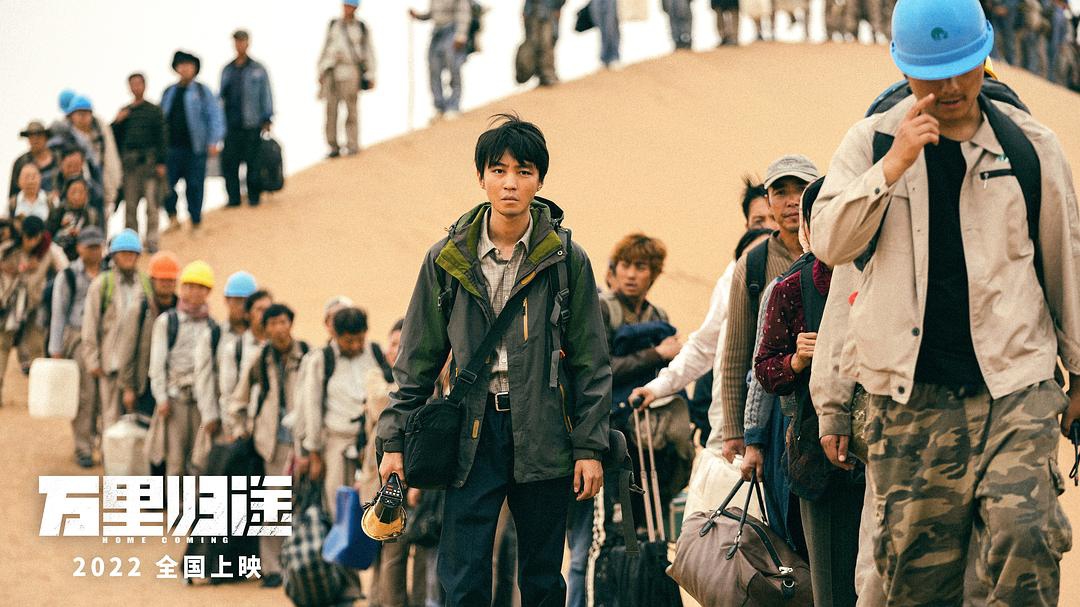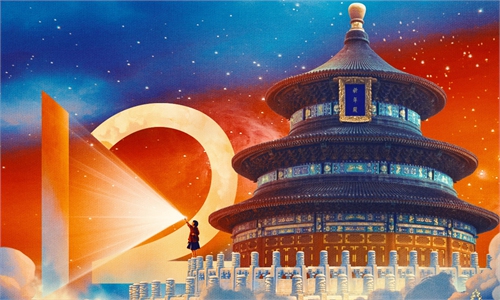Movie on China’s evacuation of overseas Chinese leads National Day box office, shows national pride and confidence in turbulent world

Promotional material for the movie Home Coming.Photo:Screenshot from Douban
One movie that took the lead in both the box office and the viewers' ratings for the National Day holidays was Home Coming. The movie tells a story of two unarmed Chinese diplomats delving into a rebel force-controlled area in a fictional war-wrecked African country to lead 125 Chinese citizens safely back home, and it has sparked a strong sense of national pride and confidence amid a turbulent world experiencing major changes.
Some moviegoers may have entered theaters expecting a Warrior Wolf-like movie, but were offered the cruelty of war and the most difficult part of diplomatic and consulate work in contrast to the traditional impression that diplomats are "clean and decent." However, the two main characters' deep love for their country and their people, strong sense of responsibilities and the greater group of Chinese diplomats in the new era they represent, touched many viewers.
The movie, starring veteran actor Zhang Yi and idol Wang Junkai, not only showed how the two diplomats, one seasoned and one new, protected their people with courage and wisdom, but also depicted different roles of common people, including stranded Chinese compatriots and locals in the fictional African country with whom Chinese people stationed there have developed deep emotional bond.
Some diplomats engage in fierce wars of words with their foreign counterparts, some are stationed abroad and interact with local communities on behalf of China, some have their life in danger in a war-hit country, but they all speak and work for the interests of China and the Chinese people, read one comment on social media platform Sina Weibo.
"There are not many cool action scenes, but thrilling in a sense that the story is in a fictional setting but not really fictional," another Weibo user posted.

Promotional material for the movie Home Coming.Photo:Screenshot from Douban
Home Coming prompted many people to recall Chinese Embassy's evacuation of more than 30,000 Chinese nationals from turmoil in Libya in 2011. Behind this sentence were many heroic stories and unswerving efforts of many Chinese diplomats. Many news reports have revealed some details of the eye-catching evacuation, and people are curious of how those touching moments can be translated into screen language.A viewer, who gave the movie 5/5 on Chinese rating site Douban, recalled his personal experience 11 years ago of being evacuated safely from a different country "because of holding a Chinese passport." "We are the lucky ones because we are well protected, because we have a strong motherland," the viewer said.
The movie is not perfect in terms of some parts of the storytelling and acting, but it struck a chord among viewers at the timing of National Day holidays, Shanghai resident Gu Sen told the Global Times on Tuesday after watching.
The stronger the bond between Chinese overseas and local people in Numea (the fictional African country), the more tragic when the rebellion pushed friends' fate onto two different paths, one to home and the other to homelessness and even deaths, the moviegoer said.
A comment liked many times on Douban reads, "Chinese passport might not get you anywhere you want, but it can always bring you back home."
A Beijing-based movie critic who preferred not to be named told the Global Times on Tuesday that the "industry cold winter" has encouraged many insiders to make quality main melody works and such genre has been leading National Day holidays box office for many years.
The success of Home Coming not only proves big theme can be delivered by down-to-earth roles and stories, but is also attributed to the growing national pride and confidence Chinese have in their country at a time when unrest occur every so often worldwide, the critic said.
Home Coming has raked in 600 million yuan ($84 million), topping the National Day holidays box office ahead of newly released movie Ordinary Hero's 90 million yuan and Steel Will's 38 million yuan.



